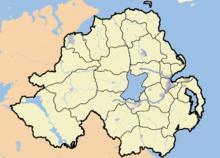Difference between revisions of "Northern Ireland"
Jessbowbag (talk | contribs) |
Jessbowbag (talk | contribs) |
||
| Line 1: | Line 1: | ||
| − | + | <div align="right"> | |
| − | + | [[Image:NorthernIreland.jpeg|250px|thumb|Wikipedia - Northern Ireland Map]] | |
| + | </div> | ||
__TOC__ | __TOC__ | ||
==Counties of Northern Ireland== | ==Counties of Northern Ireland== | ||
Revision as of 11:23, 14 October 2007
Counties of Northern Ireland
| Antrim | Armagh | Belfast | Derry |
|---|---|---|---|
| Down | Fermanagh | Tyrone |
General History
Before the last ice-age, there was no Irish Sea, English Channel or North Sea, Europe was all one land mass and the fairly sparse population was of European origin. The encroaching ice pushed out most humans although one or two tribes may have held out on the West Coast of Ireland where the gulf stream raised the temperature, probably to something like Alaska's today. After the ice-age, about 10,000 years ago, the melting ice caps raised the sea level and created the present islands which were populated by European Celts who were gradually pushed westward by fresh influxes from Europe (mainly Germanics) and Scandinavia. Ireland in particular received quite a lot of Spanish. Trade by sea flourished so there were other additions to the gene pool, e.g. Viking, and later Spanish.
The island of Ierne (Ireland) was settled by a Milesian race, who came from Scythia (Middle East) by way of Spain, and established the Kingdom of Tara about 500 BC. The supremacy of the Ardri (High King) of Tara was acknowledged by eight lesser kingdoms (Munster, Connaught, Allech, Auriel, Ulidea, Meath, Leinster and Ossory) ruled by descendants of the eight sons of Miled.
Although little is known concerning the earliest inhabitants of Ireland, there are many traces of Neolithic man throughout the island. In the later Bronze Age a Celtic race of Goidels (Gaels) appears to have invaded the island and in the early Iron Age Brythons from South Britain effected settlements in the South East, whilst Picts from North Britain established similar settlements in the North. Towards the close of the Roman occupation of Britain (they never got to Ireland), the dominant tribe in the island was that of the Scoti, who afterwards established themselves in Scotland. Gypsies, a nomadic race, originally from India, are also well represented. The overall population remained sparse, under 3 million until the 20th century.
With the separation of Britain, in the reign of Henry Vlll, from the Roman Catholic Church, Spain aggressively attempted to isolate England and sought to strengthen ties with the rest of Europe, including Ireland which remained predominately RC, culminating in a disastrous attempted invasion of England in 1588. The Armada came to grief after being forced through the English Channel, into the North Sea and rounding Scotland. It is believed that hundreds of Spanish sailors got ashore on the Irish coast and disappeared inland.
Register Office
Record Office
Links
- Ireland old News County by county
- Belfast Gazette Archives (1922-1999)
- Irish Roots message board - covers most counties
- Irish Genealogy Covers Armagh, Cavan, Derry, Donegal, Fermanagh, Leitrim, Limerick, Mayo, Sligo, Tyrone & Wexford
- Emerald Ancestors - Irish Genealogy, Irish Ancestry, Irish History Contains birth, marriage, death and census records for Counties Antrim, Armagh, Down, Fermanagh, Londonderry and Tyrone. Free search but there is a membership fee
- Kabristan Archives Graveyards from Ireland and the Indian sub-continent
- Northern Ireland Towns With Some Rep Of Ireland Towns & Villages. Introduction To Each Town. Full Description on Photographs
- Ulster Ancestry Ancestral Research Service and Family Ancestry Research
- Ulster Covenant The archive of the Ulster Unionist Council, held by the Public Record Office of Northern Ireland (PRONI), contains just under half a million original signatures and addresses of the men who, on 28 September 1912, signed the Ulster Covenant, and of the women who signed the parallel Declaration. In total, the Covenant was signed by 237,368 men, and the Declaration by 234,046 women
- CAIN Web Service Maps of Ireland and Northern Ireland
- Clogher Historical Society The history of Fermanagh, Monaghan, South Tyrone, South Donegal
- Formation of the Ulster Division A site with a mine of infomation regarding the platoons involved in the Irish question and good background infomation
- Welcome to the Ulster Historical Foundation
- Eddie's Extracts- various transcriptions relating to Northern Ireland
- North of Ireland Family History Society
Back to Ireland
Back to World Index Page
